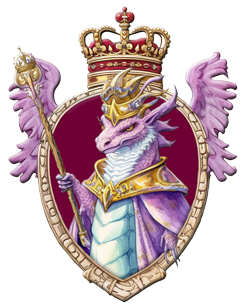Crowning a King
There is much responsibility that comes with ruling a kingdom. Are you prepared to accept that responsibility?There are several different kingdoms in the world of Verinar, each having different ways to become king and having unique, cultural differences. Because of those differences this will be a general overview of the Crowning Ceremony. But remember there is one thing a man must have in order to be king. He must be able to lead. This may be obvious, but throughout the history of Verinar, hundreds of men have stepped up as king only to fail for that very simple reason: they could not lead.
History
Before the land split into the kingdoms there are now, it used to be one large kingdom, ruled by one very powerful man. When the king became too old he would pass the crown to his son, or if he had no sons, whomever he deemed fit to take the crown after him.
This, as I'm sure you could imagine, led to more politicking than actual ruling, leading to several revolts and changes in government. During these changes in government, sections of the kingdom started to break off crowning their own king and developing their own governments.
This eventually led to the kingdoms in Verinar today. (That's a gross oversimplification, but it will do for now.) Seen throughout history there are three main ways a man was crowned king.
- By the religious ruler of that time, whether it be a pope, bishop, or other spiritual leader.
- By the previous king. This is usually if the previous king is the man's father and his father is stepping aside, because of age or other deficiency.
- By a man of high importance. This is if the man becoming king is not related to royalty or nobility.
Execution
Because of the differences in culture the order may change depending on the person being crowned, when and where it's happening. This is how the Crowning Ceremony usually happens.
Once everyone has found their seat the choir begins two songs to honor the king, whether it's his passing or his retirement as king. The assistant priest will come out giving several prayers to the patron god of the city, the patron god of the future king, and the god of kings or rulers. (The last god will vary from kingdom to kingdom.)
The choir or orchestra will begin another song to signal the arrival of the new king. He will walk down the aisle and the people will bow. The Coroner will be standing in front of the aisle.
The future king will bow before the Coroner, who will give a speech or a prayer, depending on if it's a previous king or priest. After the speech is done the altar boy will be by the Coroner's side handing him either the sword, the crown or scepter. (The order matters and does vary from kingdom to kingdom.)
Once the Coroner has crowned the king. The people will bow again, and the choir will start singing songs to honor the reign of the just crowned king.
He will walk back down the aisle and spend about a week in his palace before revealing himself to the rest of the people. (Although some kingdoms have him do it, immediately after he's crowned.)
Components and tools
Excluding the special robes the priest wears, the slightly altered songs the choir sings, as well as their robes, and the robes the assistant preist and altar boy, there are only three things needed in the ceremony. The king's banners, crown, and scepter.
The banners are the symbol of self-proclaimed power to the other kingdoms. The crown, the king's symbol of power to the nobility, ambassadors, and other kings. The scepter, a symbol of his right to rule, and of power in his castle.
However, one kingdom, Vaku Jirako , has a custom made sword that is given to the king, before the crown or scepter. This is to remind the king of the harsh history Vaku Jirako had, and to remind him not to repeat it.
Participants
Performing
- Religious leader
- Assistant preist
- Altar boy
- Choir
- Orchestra optional
Attending
- Nobility
- Ambassadors
- Wealthy common folk






Ooooh, I love the contrast of calling the person crowning the King the "coroner" makes it all seem rather macabre for such a joyous occasion.
Oh, thank you! When I put coroner I actually wasn't referring to the modern use of the word, but the historical one. Used "in England, an official responsible for safeguarding the private property of the Crown." But the modern use of "coroner" actually is sparking some ideas, so thank you!